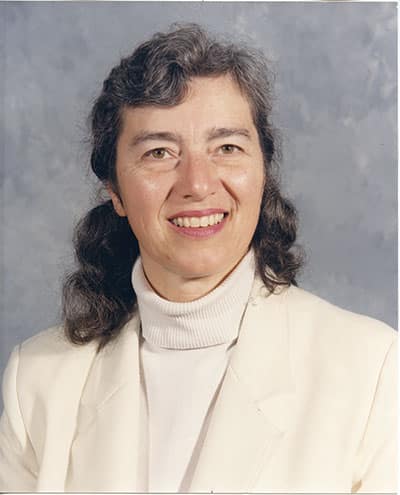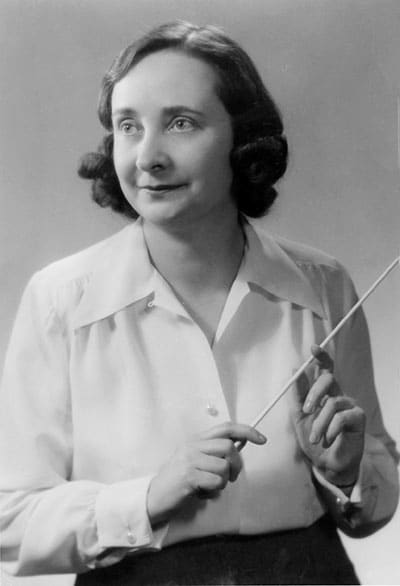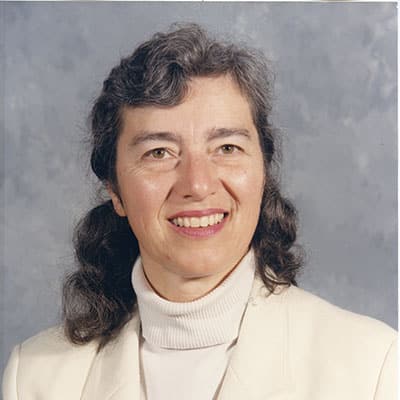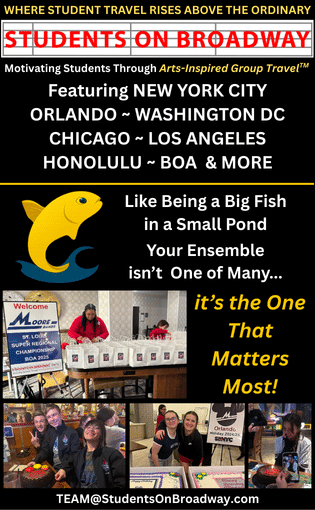Originally published: Feb. 1985
Shirley Mullins has been one of our most prolific authors over the last several decades. Her career as a music teacher in Yellow Springs, Ohio, began 60 years ago. In this excerpt, she recalls her serendipitous friendship with the legendary Elizabeth Green.

Shirley Mullins
I met Elizabeth Green in 1979, partly by chance and partly by pure chutzpah. Her books, The Modern Conductor and Orchestral Bowings, had been my companions for years. Once, as a university student in Iowa City, I had observed her coaching firsthand. She was excellent, giving helpful, constructive comments and achieving immediate results with a rather weak high school quartet.
Several years later, after moving to Yellow Springs, Ohio, I discovered that one of my cello pupils was distantly related to Elizabeth Green. That gave me the courage to call and arrange to meet her in Ann Arbor.
She replied, “Of course, my dear. Come soon and we’ll have a good chat.” A good chat, indeed. After two days with this unassuming, “retired” professor, my life suddenly took a new direction. As we relaxed over tea and cookies, she asked, “What have you written?” “Why, nothing. Nothing at all,” I blurted. “Ah, my dear, you must write. You must share your ideas.” She knew that getting published played an important role in building a career, opening new doors and numerous other opportunities.
A Remarkable Woman
Let me describe this remarkable woman by starting with her enthusiasm for her work, and through her work, other aspects of her life. Whether she is talking about her former students, her painting, or even her precious squirrels, she is full of life. She reads, studies, types, telephones, serves lunch, and drives her car with equal vitality. She did not play her violin regularly between 1974-84. In September 1984, she began daily practice again, as she did for 65 years. She continued her strong interest in young conductors, making herself available to teachers and students across the country.

Elizabeth Green
During a lunch break on the University of Michigan campus, many people stopped to speak with Elizabeth Green, to shake or hold her hand, and frequently, to share some laughter. Although she later apologized for the many interruptions in our conversation, I felt quite the contrary. For me it had been a revealing insight into her position of love and respect.
Elizabeth Green speaks with fondness and admiration for her teachers, Nicolai Malko and Ivan Galamian. Her father, Albert Green, had been her first teacher. She studied with him until she graduated from college. As a small child, she had been equally gifted in art and music. When she was about five years old, her parents decided that she should concentrate on music. Many years later she would return to her painting, pursuing a degree at Eastern Michigan University in Ypsilanti after her retirement.
Her sense of humor is contagious, her laughter often spontaneous and enthusiastic. “Sprinkle your talk with little jokes that are pertinent. Your audience might as well enjoy themselves, too,” she suggests. One summer afternoon we sat on her porch reading from Don Gillis’ wonderfully humorous book, The Unfinished Symphony Conductor. Tears of laughter rolled down our cheeks.
Listen to her own words (they describe her the best) in these bits and pieces of conversation taken from notes I hastily scribbled after my visits to her home.
“You spend the first ten years of your profession building a reputation, and the rest of your life trying to live up to it.”
“Music students learn how to manage their time, accomplishing more in less time.”
“As a young teacher, you learn to teach by working with the youngsters for whom it is difficult. If you can teach them, you can teach anyone.”
“Administration is boring. Teaching is where it’s at.”
“Teachers simply open doors.”
“Once I heard the perfect band – perfect ensemble, perfect rhythm, amazing intonation – but it was boring. The band was completely lacking in expressive, emotional playing. It was proficient but with no inspiration – like performing in handcuffs.”
To a worried student: “Your progress seems small to you because you see it daily. To me, once a weekly basis, the progress is much more apparent.”
“When the conductor’s creativity and the composer’s creativity match, that is when you get the superb performance.”
Her teaching philosophy: “You can’t make a plant grow faster by grabbing the blossom and pulling.”
Thanks to the successful work of Elizabeth Green and her contemporaries – David Mattern, William Revelli, Joe Maddy, Merle Issac, Fred Muller, and countless others – American children now study music in the public schools as part of the regular curriculum. Music education, as we know it today, exists because of the wisdom, foresight, and determination of these pioneers.






